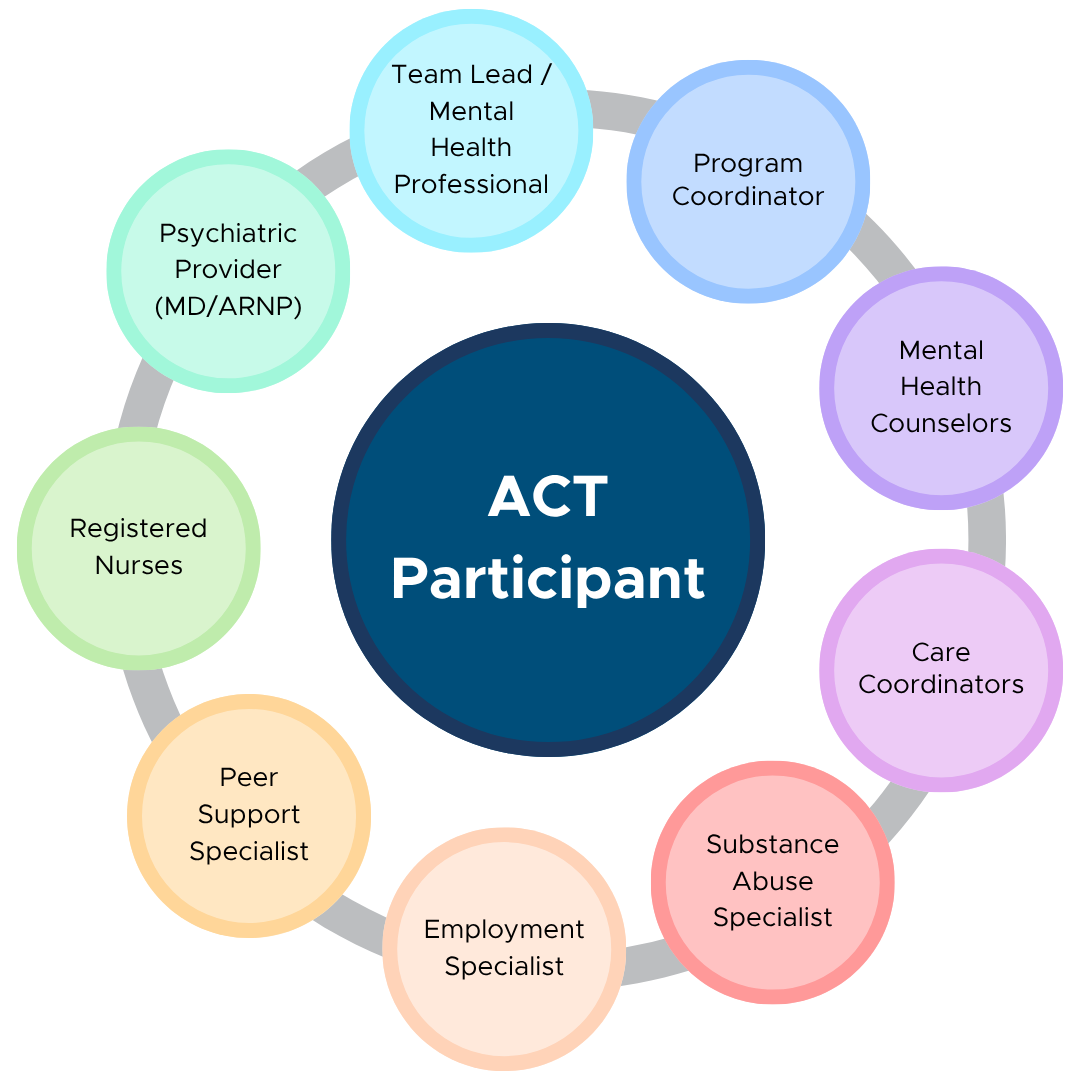Assertive Community Treatment (ACT)
Assertive Community Treatment (ACT)
On this page:
Hope in ACTion
Assertive Community Treatment (ACT) is an evidence-based practice designed to make life better for people living with the most severe symptoms of mental illness.
People with mental illness often face:
- repeat stays in a psychiatric hospital
- frequent visits to the emergency room
- struggles with substance use
- victimization
- trauma
- arrest and jail time
- homelessness
Mental health challenges can impact many areas of life:
- jobs and income
- family and friend groups
- living on your own
- spending and saving
- physical health
Many people entering ACT services have faced setbacks, stigma, and discrimination – experiences that can take away from their sense of hope.
ACT focuses on the whole person and provides support and care in the community. A team of trained professionals from different fields works together to meet each person’s unique needs. Each team member contributes to the person’s care- through treatment, skill-building, and support – working toward shared goals for recovery, stability, and community involvement.
Key Components
Service-Delivery Model
ACT’s approach to service is collaborative and muti-disciplinary. Our team has varied backgrounds and experience. We fit that expertise together to support the full range of each participant’s needs.
Community-Based Approach
When ACT participants try to access traditional, clinic-based treatment, they often face barriers – such as homelessness, substance use, and complex mental and physical health needs. ACT meets people where they are, literally: in the community. We provide care in the most integrated, community-based setting possible. This promotes independence, self-empowerment, community integration, and recovery.
Employment and Education
Working and learning are important to reaching personal goals, financial independence, and a meaningful quality of life. ACT supports people pursuing these goals. Supported Employment Services are built into the team and tailored to each person’s own strengths, interests, and journey.
Proven Outcomes
Decades of research show ACT is more effective than traditional treatment for people with complex needs. Participants in ACT programs experience:
- Less time spent in hospitals and jails
- More stable housing and the ability to live on their own
- Improved results at work
- Fewer symptoms and reduced substance use
- Better overall quality of life
Program Goals
Clinical Care & Crisis Prevention
- Lessen or eliminate the worst symptoms of mental illness
- Minimize or prevent acute psychiatric episodes
- Deliver care through a trauma-informed and harm reduction lens
Basic Needs & Daily Living
- Help participants meet basic needs such as food, housing, and healthcare
- Support stable housing
- Address legal and financial issues
- Promote economic self-sufficiency
Recovery & Quality of Life
- Enhance overall quality of life
- Promote dignity, hope and well-being
- Foster community integration
- Encourage use of natural supports
Skill Building & Personal Growth
- Teach community living skills
- Support personal recovery goals
- Assist with schooling, employment and building social connections
Transition & Integrated Care
- Provide services for as long as someone wants and needs intensive support
- Use a Transition Readiness Assessment Tool to plan transitions together
- Design a gradual step-down process to lower levels of care
- Coordinate transitions to ensure consistency and stability
Services
ACT professionals are trained across many specialties, allowing us to provide nearly all treatment services directly through the team. Options are flexible and individualized, based on each participant’s strengths, needs, and recovery goals.
Services include:
- Case management
- Counseling and psychotherapy
- Psychiatric services
- Medication support
- 27/7 crisis response (ACT crisis consult line)
- Group-based support and psychoeducation
- Substance use disorder recovery support
- Employment and education support
- Housing support
- Peer support and advocacy
- Skills training related to related to recovery from mental illness and substance use
- Support for families and other natural supports
Services are flexible and personalized, based on each person’s strengths, needs and goals.

In Benton County, the Complex Care Team provides medical care for ACT participants. This allows us to align primary health care goals alongside behavioral health services.
Referrals Process
If you think ACT is a good fit for you, you can work with your provider to fill out and submit this referral form.
Please call 541-766-6767 or email ACT@bentoncountyor.gov for more information.
Related Services and Info

Complex Care Team
This service coordinates care for those with complex health needs, including physical health, mental health, dental health, and other providers.

Substance Use Disorder Treatment
Individual and group counseling services for people who want to change their relationship to substance use.

Behavioral Health Support Services
Peer, Employment, and Housing support services for clients enrolled in Benton County Behavioral Health programs.

Adult Behavioral Health
We offer a range of Adult Outpatient Mental Health Services. Our care teams focus on best practices for therapy and treatment.

Crisis Services
Information and resource for crisis phone lines, crisis text services, in person drop-in counseling, and mobile crisis services in the community.

Behavioral Health in Primary Care
This service links a qualified mental health provider to our health care teams and supports our primary care providers improve overall health outcomes of our patients.
